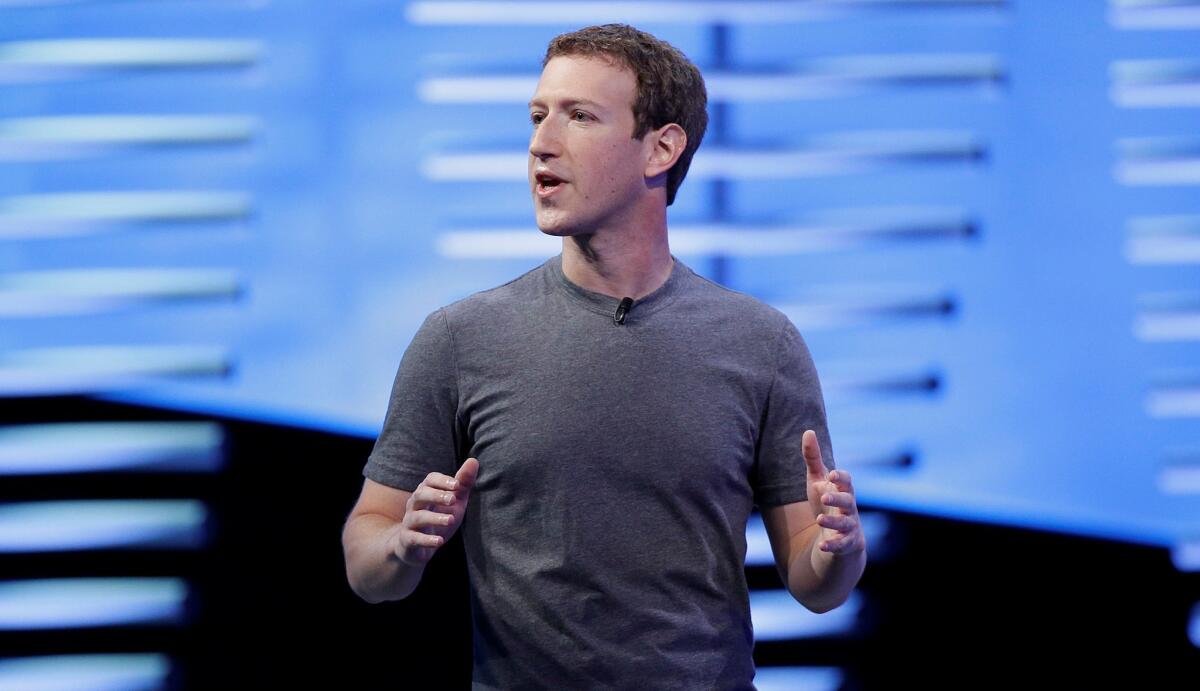How creating new Facebook stock will keep Mark Zuckerberg in control

Facebook chief Mark Zuckerberg’s shares in the company give him overall voting power of 60%.
When Facebook Inc. announced its first-quarter earnings Wednesday, a few things were clear: The number of users on the social network is climbing, its ad revenue is soaring and its shareholders have every reason to be smiling ear to ear.
The company’s stock jumped more than 7% on Thursday to a high of $116.73.
Less clear was the company’s proposal to create a new class of stock known as Class C shares.
What does creating Class C shares mean?
Facebook currently has two classes of shares. Class A shares entitle shareholders to one vote per share. Class B shares carry 10 votes each. Mark Zuckerberg, the company’s chief executive, owns nearly 4 million Facebook Class A shares and 468 million Class B shares, giving him overall voting power of 60%.
Under the proposal, Facebook would give shareholders a dividend of two non-voting Class C shares for every Class A or B share they have, effectively splitting the stock three ways.
Why would Facebook do this?
“The point of this is to keep control of the company in the owner’s hands -- in this case, Mark Zuckerberg,” said Jason Moser, an analyst with the Motley Fool.
Companies tend to issue stock as compensation, particularly when they acquire new companies, employees or technologies, Moser said. Over time, this can dilute founders' voting power and threaten their majority control of the business. In Zuckerberg’s case, he and his wife, Dr. Priscilla Chan, announced the creation of a limited-liability corporation last December to which they would give 99% of their Facebook shares during their lifetimes for charitable purposes. Doing so would have diluted Zuckerberg’s voting power.
“This will allow him to give away his wealth sooner rather than later” without having to worry about losing control of Facebook, Moser said.
See the most-read stories this hour >>
Should shareholders be worried?
Other companies, including Google Inc. and Under Armour Inc., have made similar moves in the past. Although some might perceive the stock splits to be a power grab by founders, the founders of these companies already had majority voting power, so, Moser said, it ultimately doesn’t make a difference to shareholders.
“If Facebook was a poorly run company, then I could see why they’d be concerned,” Moser said. “But you could argue that those who have invested in Facebook from the beginning have done very well thanks to the decisions that Zuckerberg has made in bringing this business to what it is today. And yes, it ultimately keeps control in the founders’ hands, but they’ve proven that to be a good choice.”
Join the conversation on Facebook >>
What are the possible repercussions?
Daniel Salmon, an analyst with BMO Capital Markets Corp., described the news as a “non-event,” saying in a note to investors that even before the announcement, Facebook was already a founder-controlled company.
But analyst Richard Windsor of Edison Investment Research said the news was problematic.
“When this type of structure persists, no one minds until things start to go wrong,” Windsor said. “When problems arise, founders tend to be more emotionally attached to losing strategies than professional managers.” And because no one can force them out, companies tend to “stick with these losers far longer than they should.”
Is the stock split definitely happening?
The new structure is subject to shareholder approval at Facebook’s annual meeting in June. Given that Zuckerberg controls the company, it’ll probably sail through.
Twitter: @traceylien
SIGN UP for the free California Inc. business newsletter >>
ALSO
Why paid parental leave won't go national
When Sports Authority closes, these retailers win
L.A. billionaire gets a $148-million payday even as his company's stock tanks
UPDATES:
1:35 p.m.: This article was updated with Facebook stock's closing price.
This article was originally published at 11:23 a.m.




